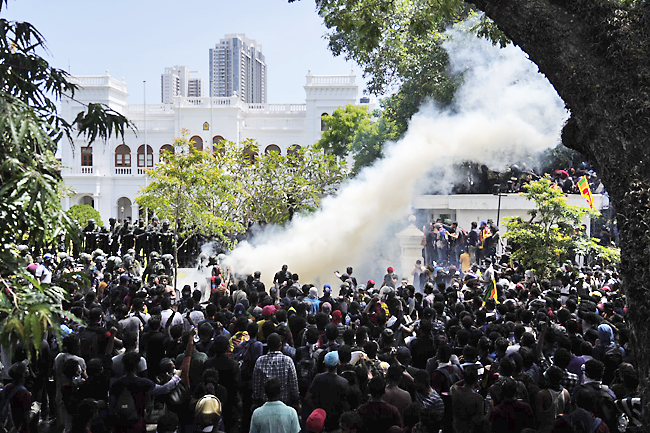COLOMBO (AFP) – Sri Lanka declared a state of emergency yesterday after the president fled overseas to escape anti-government protests, as thousands of people took to the streets, again furious that he had not yet stood down.
President Gotabaya Rajapaksa had promised at the weekend to resign yesterday after escaping his official residence in Colombo just before tens of thousands of protesters overran it.
As president, Rajapaksa enjoys immunity from arrest, and he is believed to have wanted to go abroad before stepping down to avoid the possibility of being detained.
He, his wife and two bodyguards were the four passengers on a military aircraft that took off from Sri Lanka’s main international airport, immigration sources told AFP.
Hours later, with no formal announcement he was stepping down, thousands of demonstrators mobbed the office of Prime Minister Ranil Wickremesinghe – whom Rajapaksa named as acting president during his absence – demanding both officeholders should go.

“Go home Ranil, Go home Gota,” they shouted.
Police fired tear gas to hold them back from overrunning the compound and officials declared a nationwide state of emergency, the prime minister’s spokesman Dinouk Colombage told AFP.
Police imposed an indefinite curfew across the Western Province, which includes Colombo, “to contain the situation”, a senior police officer said.
Wickremesinghe would automatically become acting president if Rajapaksa steps down, but has himself announced his willingness to resign if consensus is reached on forming a unity government.
The prime minister’s office confirmed that Rajapaksa had left the country, but said it had no schedule for any presidential resignation announcement.
The succession process could take between three days – the minimum time needed for Parliament to elect an MP to serve out Rajapaksa’s term, which ends in November 2024 – and a maximum of 30 days allowed under the statute.
Rajapaksa is accused of mismanaging the economy to a point where the country ran out of foreign exchange to finance even the most essential imports, leading to severe hardships for its 22 million people.





